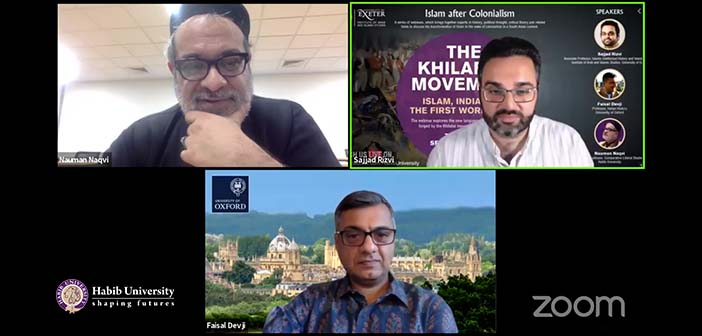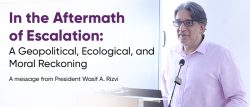The webinar was the first in a series, ‘Islam after Colonialism’, initiated by Habib University and the University of Exeter
KARACHI: Habib University in collaboration with the UK’s University of Exeter organized a webinar on ‘The Khilafat Movement — Islam, India and the First World War’ in which eminent historian Prof. Faisal Devji was the main speaker.
Prof. Devji, who was introduced to the audience by Dr. Nauman Naqvi, giving a historical description of the movement, said it began in the aftermath of the First World War in which the Ottoman Empire was defeated along with Germany. There was an immediate move by the victorious powers, Britain and France, to divide up the large parts of the empire. Indian Muslims were sufficiently outraged by these moves. This unprecedented mobilization of Muslims was seen as both imperialist and anti-imperialist, nationalist and anti-nationalist (there were people who accused it of politicizing religion).
It was not an exceptional movement because Khilafat was one of three such movements which occurred around the same time, all of which had a religious dimension to them. The other two being: the rise of Indian diaspora (Gandhi was not averse to using religious language in his activism for Indian diaspora) and the Ghadar movement.
One of the great objectives of the movement was to protect the shrines in Arabia and Iraq
Prof. Devji said they were interesting because they addressed the British Empire’s global reach. The British Empire was very large, scattered across the surface of the earth, and had no geopolitical integrity. It couldn’t be imagined the way the Ottoman Empire was imagined which was why it tended to justify [itself]in humanitarian terms. (Quoting a Western scholar the historian gave the example of the abolition of slavery.)
The Muslim Khilafat, too, called upon the British to uphold the religious freedom that it had allegedly promised them. The Muslim leaders’ (the Ali brothers and Dr. Ansari) point of reference was the 1857 mutiny and the queen’s proclamation of 1858 that guaranteed religious freedom to Hindus and Muslims. It’s this proclamation that the Khilafat turned to over and over again; for example, in the trial of the Ali brothers. In doing so they completely took leave of the war and its logic.
Prof. Devji highlighting the humanitarian character of the movement talked about the most significant event related to it when in 1920 hijrat happened. It was a large-scale migration of Muslims from the Frontier, Sindh, Balochistan, and to some degree from Punjab, to Afghanistan. They left India because they thought India had become a place unfit for Muslims –– it was no longer the Darul Islam or had religious freedom. The Afghans expected them [migrants]to modernize Afghanistan. “The proposal of Pakistan could also be seen as part of this logic.”
Prof. Devji referenced a book The Future of Islam by Wilfrid S. Blunt that came out in the late 19th century claiming that before that it was not even possible to think about such a novel phrase [the title of the book]. The author argued that the Muslim world was at a risk of colonization by European powers, the Ottoman Empire was going to be destroyed and the whole of North Africa was going to be taken over by European powers. Therefore, the world of Islam needed to reconstitute itself in eastern and southern ends. The writer, he pointed out, went on to think about the Muslim world protected by the Royal Navy with India providing its demographic center but with Arabia as its notional center with no political role to play.
By the time it came to the Khilafat Movement, there was a similar set of geographical ideas with people like Maulana Azad talking about the Muslim world in a bifurcated way. One of the great objectives of the Khilafat Movement was to protect the shrines in Arabia and Iraq. [But] the argument was rarely geographically described. It’s described in terms of sacred light.
Originally Published in Dawn, on September 26th, 2020
Accessible via: https://www.dawn.com/news/1581727/habib-university-webinar-discusses-khilafat-movement




